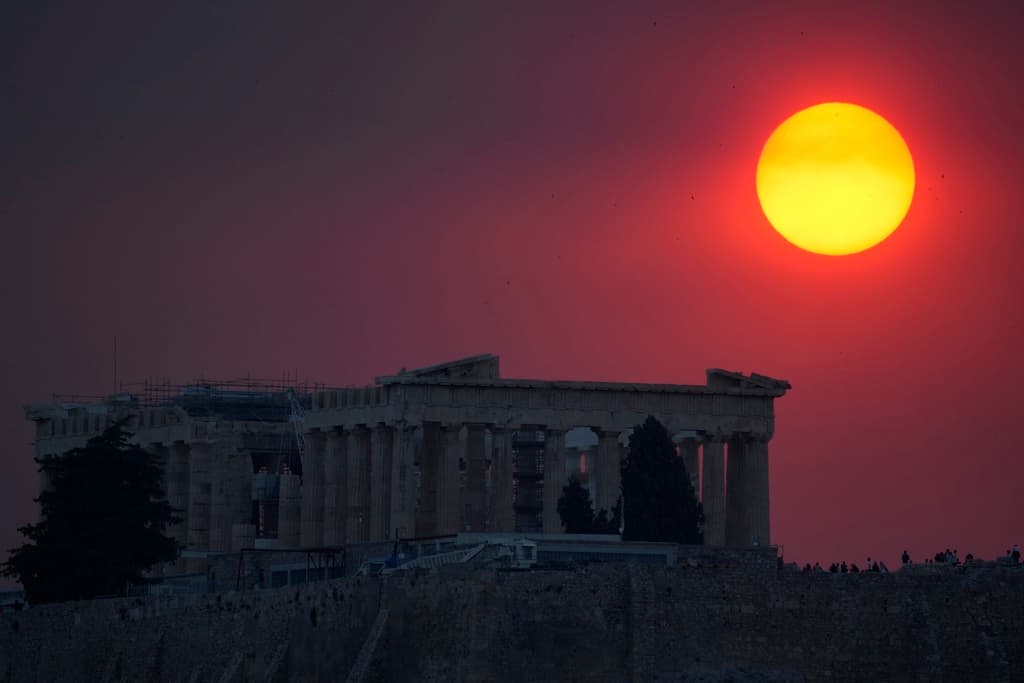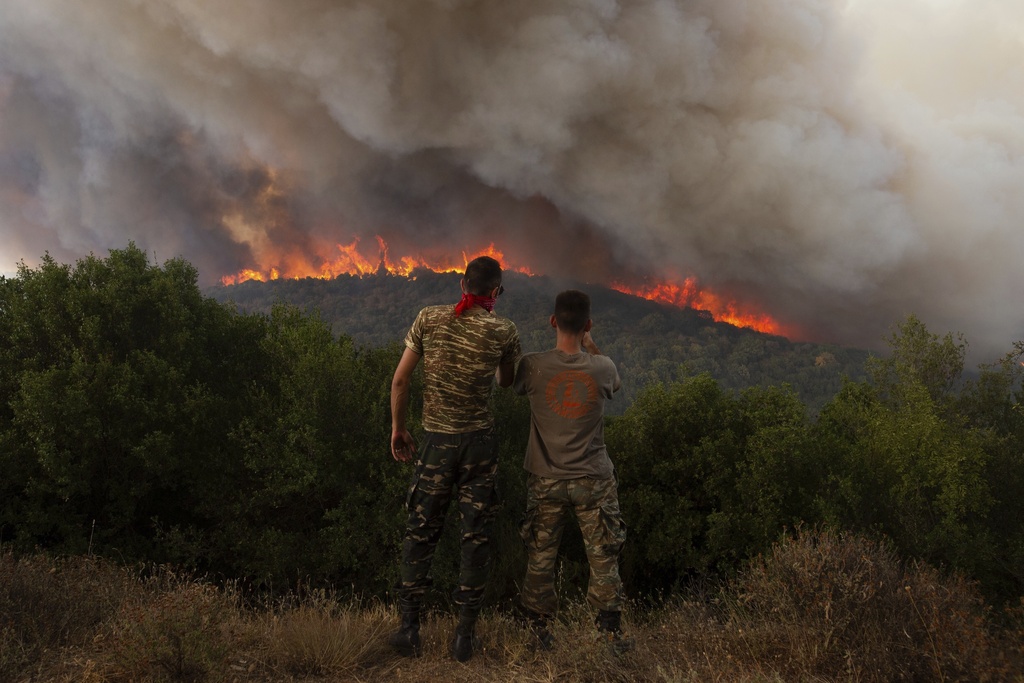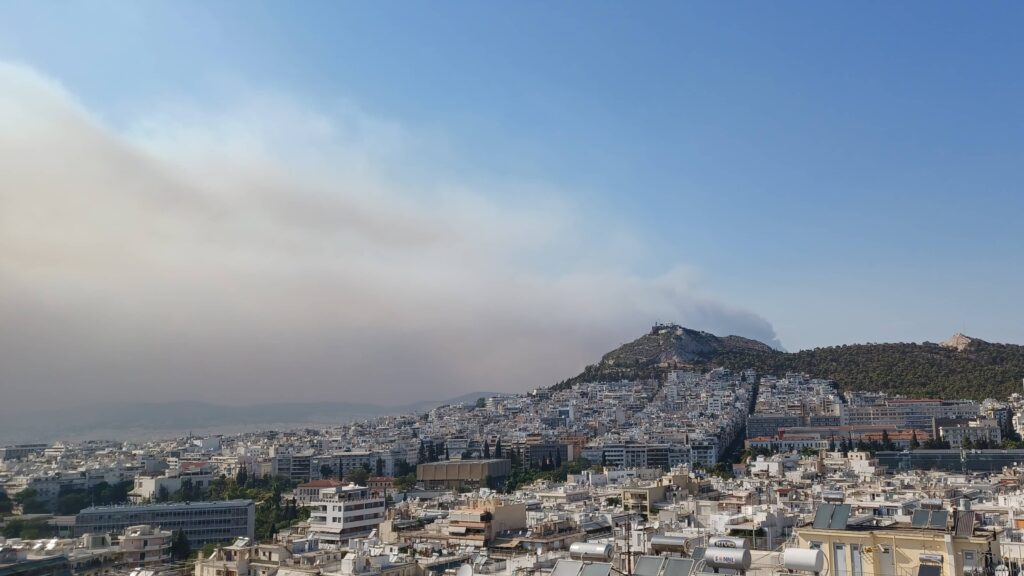Climate Change, If It Exists, Could Be Cleared as Suspect in Greek Forest Fires as Authorities Start Accusing, and Arresting, Arsonists
Deadly wildfires — fanned by the meltemi — are taking a vast toll on the landscape as authorities crack down on human culprits

ATHENS — Forest fires are raging in Greece, but tempers are flaring too. In a televised emergency briefing this week Greece’s minister of civil protection, Vassilis Kikilias, said that “arsonist scum are setting fires that are threatening forests, property and, most of all, human lives,” adding that “You are committing a crime against the country, you will not get away with it, we will find you, you will be held accountable.”
Mr. Kikilias, who formerly served as the country’s tourism minister, said that the police and the state intelligence agency, EYP, are investigating multiple incidents. A government spokesperson, Pavlos Marinakis, told Greek public broadcaster ERT that of 140 wildfire-related arrests, 79 were related to arson.
While the pinpointing of arson as the cause for many if not all of the blazes that have ravaged Greece will come as no surprise to anyone who has ever lived in a fire-prone region , it has also inflamed public opinion in this Mediterranean country. It undercuts a prevailing liberal argument that the summer’s devastating wildfires can be blamed on climate change alone.
The European Commission says that more than 280 square miles—have been burned by wildfires so far this summer in Greece. That makesthem “the largest wildfires on record that the E.U. has faced.” A large fire near the port city of Alexandroupoli figured prominently in that assessment. Earlier in the week the bodies of 19 people, reportedly undocumented migrants, were found burned in the Evros region of northeastern Greece, near the Turkish border.
In the Boeotia region, a shepherd perished in flames in a separate blaze that sent smoke pouring over a mountain ridge toward Athens. As elsewhere, high winds hampered firefighting. The dry “meltemi” winds are typical for Greece this time of year.

Mr. Kikilias also said that there have been several attempts by arsonists to start new fires on Mount Parnitha, the largest forest bordering Athens, since Thursday morning, and remarked that fires started in several places at the same time. He added that authorities identified a silver pickup truck which is likely linked to the arson activity.
Authorities at Psachna on the Greek island of Evia arrested an 18-year-old man on suspicion of two counts of arson. The man, who reportedly has an intellectual disability, is alleged to have placed tires under an electricity pylon and set them on fire.
At Karystos, also in Evia, police questioned a 48-year-old man on suspicion of setting four fires in the area a month ago. At Avlonas, in the Attica region that encompasses Athens, a 45-year-old man was charged with arson after appearing before a prosecutor. His lawyer said his client recently stopped his treatment for psychiatric problems.
Adding insult to injury, at Kefalonia, a large Greek island south of Corfu, a 42-year-old volunteer firefighter who confessed to six counts of arson in forested areas on the island has been placed under house arrest.
Firefighters are currently battling 111 wildfires across the country after 59 new blazes broke out in the 24 hours from Thursday to Friday alone. While the fires have not reached Athens itself, the Acropolis has been intermittently shrouded in a smoky haze and air quality has suffered.
Levels of particulate matter have periodically reached dangerously unhealthy levels on the skies above Athens and plumes of smoke have spread as far west as Sicily and Malta. One of the blazes still burning north of Athens destroyed a portion of a national forest, one of the few pristine green areas left near the densely populated capital.

While scientists say that climate change can exacerbate fires, and notably cause them to spread faster in flammable landscapes, the announcement of so many arson arrests came as a stark reminder that climate change may only be a corollary to the main cause: people.
Scattered lightning strikes triggered a number of small fires near Athens on Saturday morning, but like the seasonal meltemi winds, pop-up thunderstorms are a common feature of the late summer Mediterranean climate.
The Greek press is rife with accounts of human folly leading to disaster: a man carelessly tossing a lit cigarette into a pile of dry brush and setting off a fire accidentally is just one example.
Greek patience is running thin. Now even those found guilty of negligent arson could face steep fines and prison sentences.
Greece’s minister of justice, Giorgos Floridis, said that pending revision of the criminal code, “we will seek to reduce the feeling of impunity. Penalties will be served. Anyone who thinks [of starting a fire] after the changes should think very carefully.”

